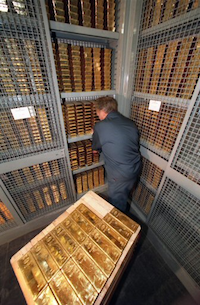September 13, 2012
 Economists and politicians have debated the merits of gold for decades. In the last 10 years, the discussion has been even more hotly contested, as the price of the yellow metal has skyrocketed. Ron Rimbus, CFA, in a blog for the CFA Institute, is the latest person to take on the subject.
Economists and politicians have debated the merits of gold for decades. In the last 10 years, the discussion has been even more hotly contested, as the price of the yellow metal has skyrocketed. Ron Rimbus, CFA, in a blog for the CFA Institute, is the latest person to take on the subject.
Rimbus argues that the intrinsic value of gold is intricately linked to what’s going on in the financial system, even after the end of the gold standard in 1971. He writes,
“Just because the world switched to a fiat money system, does not mean that the virtues of gold have changed at all in the past 40 years. Quite the contrary, the virtues of gold have remained the same. It is the political climate that has changed. The hardest thing for an investor to wrap his mind around is that the intrinsic value of gold is not a singular price per se. Rather, gold derives its value as a put on government finances. The more egregious the fiscal and monetary policy, the most valuable gold becomes.”
A “circular loop of debt and easy money,” as Rimbus puts it—skyrocketing debt burdens held by the largest economies along with the fact that these nations seem to lack the courage for fiscal discipline—should make gold all the more valuable to investors.
He concludes by saying, “When the world appears ready to give up on debt and easy money, then you should give up on gold … but not a moment sooner.”
Read Ron’s post to find out when you should stop buying gold.
All opinions expressed and data provided are subject to change without notice. Some of these opinions may not be appropriate to every investor. By clicking the link above, you will be directed to a third-party website. U.S. Global Investors does not endorse all information supplied by this website and is not responsible for its content.










